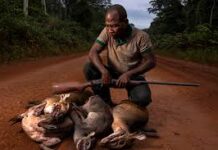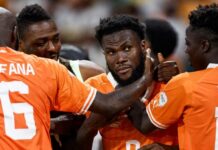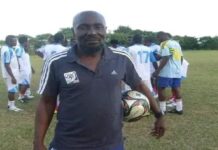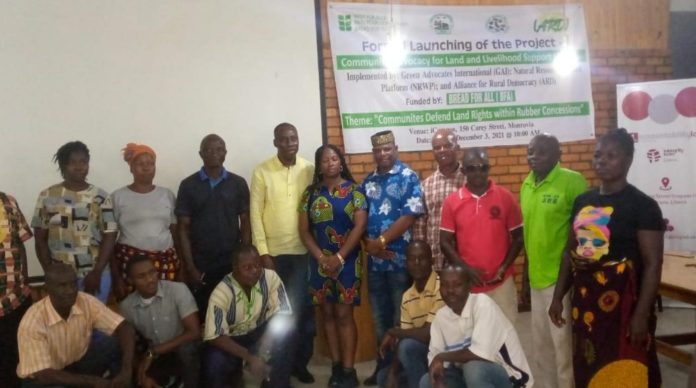A project designed to promote social cohesion amongst affected communities, improve the supportive environment for human rights defenders and support small-scale community based livelihood initiatives within concession areas was launched in Monrovia.
Titled Communities Advocacy for Land and Livelihood Support’ (CALLS), the project will be implemented in Bong, Margibi and Grand Bassa counties. It focuses on promoting better engagement practices through a non-violent approach and enhancing collective advocacy within rubber plantation communities; recruiting new members.
Implementing partners are Green Advocates International (GAI), Alliance for Rural Democracy (ARD) and Natural Resource Women Platform (NRWP). They will work with aggrieved community members in these plantation areas to promote cardinal relationships between companies and affected communities members.
The three year project was launched under the theme: “Communities Defend human rights within rubber concessions” and it is fully funded by Bread for All (BFA), a church-based organization in Switzerland.
The concerned rubber plantations include Salala Rubber Corporation (SRC) and the Liberia Agricultural Company (LAC).
Launching the project, Head of Programs at GAI, Francis K. Colee said that concession companies and human rights advocates are not enemies. Rather, he said they should work together for the good of community members.
Colee added: “We sit and do background investigations. We at Green Advocates work with stakeholders, communities and companies. We represent the communities because they are our clients. We work with the government, communities and companies because we strive for a win-win situation where companies invest to make profit.”
Abraham Kamara, Chairman of the Yeabamah National Congress for Human Rights, a community based advocacy group at Salala Rubber Corporation in Margibi and Bong Counties, accused the company of considering human rights defenders as enemies.
“We, human rights defenders, are ill-treated by the Salala Rubber Corporation (SRC), but our partners, Green Advocates International, ARD and others are doing very well for us. SRC sees us as enemies and we don’t move freely, they point accusing fingers at us every day.
We want President George Weah to join GAI and international partners to deliver us from slavery at SRC. They are ill-treating us and saying they gave our government money,” he said.
In response to Kamara’s accusation, Jallah Mensah, a representative of Salala Rubber Corporation disclosed that his company has engaged communities and they are incorporating outsiders in their school system, allowing them to pay minimum fees.
Monway however said the company needs to do more for the communities. “GAI, ARD and others have opened our eyes on the importance of land as community people. We have not been tampered with, but we have not been given the opportunity to work. We don’t talk about things that are not happening in our area. We want the company to work with us.”
Meanwhile, the Human Resource and Administrative Manager of the Liberia Agricultural Company (LAC), Harry Attoh, said they have engaged the various communities positively. Speaking at the launch of the project, Deputy Internal Affairs Minister for Operations, R. Matenokay Tingban commended GAI, ARD, and others for the project for working with the local communities and the companies.
As a ministry, he said, they are working with local communities to improve the livelihood of rural communities.
Silva Lieberherr, Policy Advisor for Land Rights and Agriculture, Bread for All, said her organization supports communities in their struggle to get back their land. These are difficult struggles and the companies do not stand by idle. Rather, they try to divide and intimidate these advocacy movements.
Silva: “We support communities who suffer from the loss of land through the hands of international corporations. And the problems of those communities in Liberia or Indonesia, in Sierra Leone or Malaysia are very similar. Indigenous People depend on their lands for their livelihood in so many ways. For medicine, for building materials and last but not least for food.
According to her, when their lands are taken, the people lose their means of survival and become dependent on these corporations. But the corporations don’t provide better opportunities for the directly.
“No adequate jobs, no child-hood education or medical care. The corporations sometimes use force to get the land in the name of national development. Or they make promises for schools or jobs or development. Promises that remain empty for the big majority of the people. These people then face the daily struggle for survival. “
“Bread for all supports these direct affected communities in many countries in their struggles to get their land back. These are difficult struggles and the companies don’t stand by idle. Rather, they try to divide and intimidate these advocacy movements,” she lamented.
‘’Bread for All calls for renewed attention to the communities that are affected by the Salala Rubber Corporation in Margibi/Bong and the Liberia Agricultural Company in Grand Bassa Counties. Both belong to the Socfin group which has its operational center in Switzerland. With this project, we hope to be of help to the struggle of the people affected by these two plantations’’.
The role of Abraham Kamara
Abraham Kamara is the organizing Chairman of the Yeabamah National Congress for Human Rights (YNCHR), one of the supporting organizations that filed the complaint with the Compliance Advisor Ombudsman (CAO), the independent watchdog and accountability mechanism of the International Finance Corporation (IFC) on behalf of the 22 communities affected by the operations of the Salala Rubber Corporation (SRC).
He has been at the full front fighting for the economic, social and cultural rights of affected communities resulting from the grab by SRC, of their land, destruction of their livelihood, burial and sacred sites.
According to Abraham, traditional leaders and their practices represent another powerful voice of the affected communities. In 2014, traditional leaders came out with mask dancers and stopped the operations of the company, insisting that if SRC would not allow dialogue to resolve community grievances, then the company would no longer operate on their land.
Abraham Kamara Pays Gruesome Price for Advocacy
Abraham has had to pay a heavy price for defending the cause of the communities against the advice of his family to abandon his advocacy. Local authorities, who are induced by SRC, see him as working against the Company and therefore a threat to their interests and development of their communities. On two separate occasions in 2015, he was arrested along with others for his activism on the plantation.
In those two instances, he spent nine and eight days respectively in police custody and would be set free only at the intervention of lawyers of Green Advocates International. On one of those occasions, State security personnel protecting the plantation, sprayed tear gas directly in his eyes at very close range and he’s now slowly going blind. He stands in need of advanced medical attention to restore his sight.
In spite of the associated risks, threats and family pressure, Abraham remains a strong voice in the struggle to get the agriculture Company to pay damages for the destitution visited upon the community.
But as a result of the terrible experiences in the past, he has been forced to make some adjustments in the strategy to stay alive first in order to keep the struggle alive. “If you do not want to die, don’t sleep” is their maxim.
Visually Impaired Kamara`s Strategy
Over time, he and his fellow campaigners had disguised themselves many times like ordinary villagers as a tactical approach, commuting between villages to get their messages across to the people. He believes a rapid Legal defense in times of trouble, backing from local and international organizations, transportation and communication are key to protecting them and enhancing the work of defending the community.






















